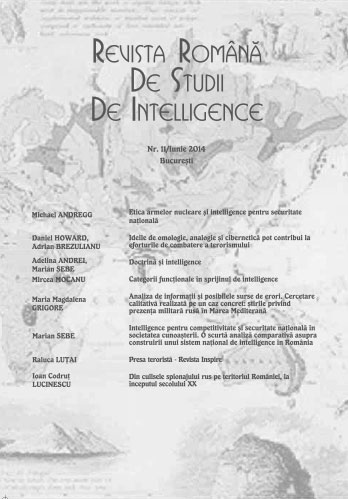Intelligence pentru competivitate si securitate nationala in societatea cunoasterii
Intelligence for competitiveness and national security in the knowledge society (I)
Author(s): Marian SebeSubject(s): Social Sciences
Published by: National Institute for Intelligence Studies
Keywords: national intelligence model, competitiveness, national security, Knowledge Society, knowledge capital
Summary/Abstract: With the transition to the knowledge economy, the value of all social, organizational and individual entities is directly dependent on its intellectual and knowledge capital. Unfortunately, the majority of decision-makers focus too much on the tangible assets, almost to the point of ignoring the intangible ones. However, in order to successfully navigate this world, where the global is directly connected to the local it is essential, to first understand the interaction between certain key-concepts, such as politics, economy, knowledge, intelligence, strategy, competitiveness and security. In the new evolution paradigm knowledge means value, while intelligence means power, that is why the paper analyzes the evolution of national intelligence systems in an attempt to shed some light on the interaction models employed at international level, which can then be adapted an re-configured to fit the necessities of developing countries, willing to engage in such a national endeavor. To develop a national intelligence model applicable for Romania, the study employs benchmarking analysis to compare the structure and performance of various national intelligence systems and extract those structural elements that fit the overall approach to continuous improvement. To insure the efficiency of the results, we have selected for the comparison leading examples of national intelligence systems: the US, France, Great Britain, Canada and Germany. The analysis resulted in a set of guidelines and best practices that, after integration can be used to elaborate a blueprint for the development of a Romanian national intelligence system by both decision-makers and representative of the academia and private sectors. This research product is by no means comprehensive, as there are many other case studies that could and should have been included in the benchmarking analysis, in order to create a full picture of the overall evolution undergone by states in the process of developing national intelligence systems. Though the issue of national intelligence system has been debated before, both in the academia and at governmental level, as proven by the existence of the Carayon Report and the works of Robert Steele, this has always occurred in large states, with a strong tradition in the field. The originality of this paper it that is uses benchmarking to try to understand the processes taking place in all those places and then extract key elements and patterns that then can be re-adapted and replicated for a different type of state, such is the case of Romania.
Journal: Romanian Intelligence Studies Review
- Issue Year: 2014
- Issue No: 11
- Page Range: 81-100
- Page Count: 20
- Language: English

